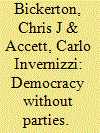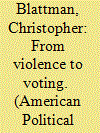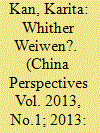| Srl | Item |
| 1 |
ID:
130946


|
|
|
|
|
| Publication |
2014.
|
| Summary/Abstract |
This article looks at the legacy of 'Berlusconism' for Italian politics. On the right, we identify a process of fragmentation. As a result of the personalised leadership of Silvio Berlusconi, where loyalties and ties were to il cavaliere as an individual rather than to a party or a political tradition, there is little by way of legacy on the right. Surprisingly, we find that Berlusconi's greatest legacy lies on the left of Italian politics, in the figure of Matteo Renzi. In his savvy manipulation of the media and in the careful construction of his own image, accompanied by a non-ideological set of political slogans, Renzi has gone even further than Berlusconi. As a result, he may be the one to final bury Italian 'party government' and all its associated traditions and ideals.
|
|
|
|
|
|
|
|
|
|
|
|
|
|
|
|
| 2 |
ID:
090807


|
|
|
|
|
| Publication |
2009.
|
| Summary/Abstract |
What is the political legacy of violent conflict? I present evidence for a link from past violence to increased political engagement among excombatants. The evidence comes from northern Uganda, where rebel recruitment generated quasiexperimental variation in who was conscripted by abduction. Survey data suggest that abduction leads to substantial increases in voting and community leadership, largely due to elevated levels of violence witnessed. Meanwhile, abduction and violence do not appear to affect nonpolitical participation. These patterns are not easily explained by conventional theories of participation, including mobilization by elites, differential costs, and altruistic preferences. Qualitative interviews suggest that violence may lead to personal growth and political activation, a possibility supported by psychological research on the positive effects of traumatic events. Although the generalizability of these results requires more evidence to judge, the findings challenge our understanding of political behavior and point to important new avenues of research.
|
|
|
|
|
|
|
|
|
|
|
|
|
|
|
|
| 3 |
ID:
118691


|
|
|